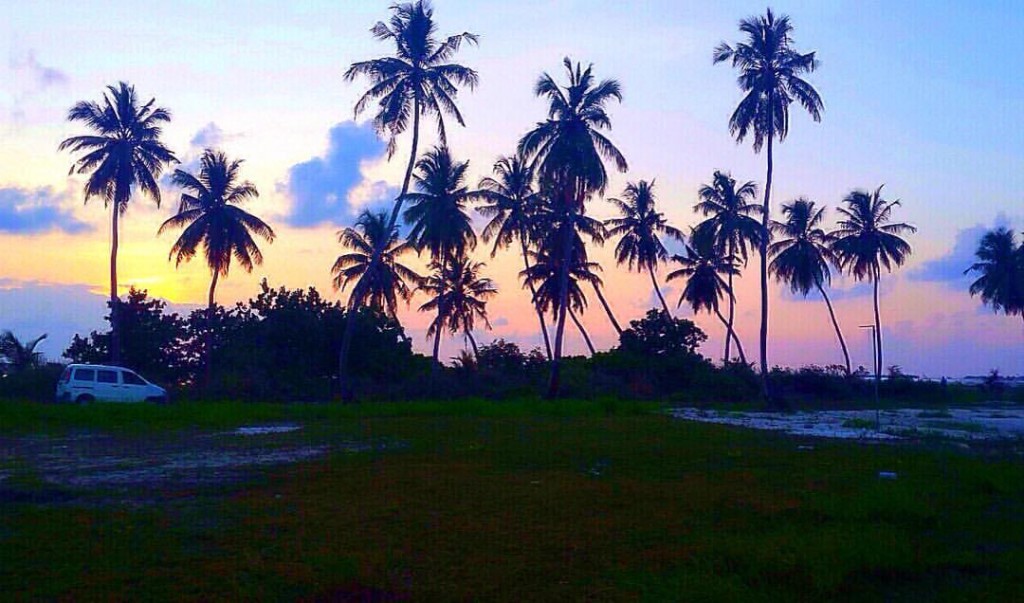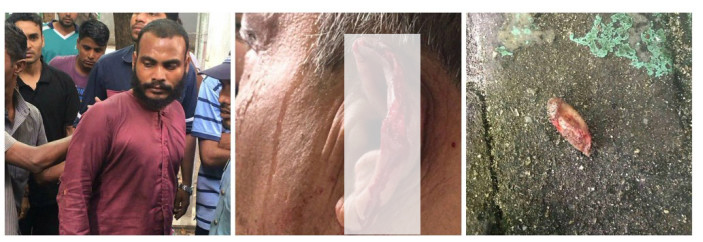A Day in the Life of Maldives
by Azra Naseem
This is a summary of stories that made headlines one day (2 March 2016) in the Maldives, where living is often chaotic, absolutely without justice, devoid of security and increasingly lacking in civil and political freedoms. While packed with more than the usual amount of drama, this kind of day is increasingly the norm, and provides some insight into the far from ‘heavenly’ lives of ordinary Maldivians.
– Murder in a swamp.
– Jinni leading bomb squad.
– Cannibalism in Mosque.
– Gov’t giving free lightsabers to each household.
It’s only noon.— Naif Naeem (@nAAYf) March 2, 2016

Morning
Shortly after sunrise, Aminath Mohamed walks over to her brother’s corner shop near her home on the island of Hithadhoo in Addu Atoll. The shop door is open and the lights are off. Aminath senses something is not right.
She goes to the shop every morning after Fajr prayers. Her brother, Ali Abdulla – Ayya as everyone calls him – has run the shop for 15 years. His habit is to keep the shop open through the night. He usually leaves in the early hours of the morning, and Aminath comes in to switch the lights off when daylight arrives.
Ayya leaves the night’s earnings in a drawer behind the counter, to deposit at the bank when it opens at 11:00 a.m. Today, the drawer is sitting on the chair, removed from its place behind the counter. There is nothing in it. Aminath’s suspicions grow: something bad has happened to her brother.
Ayya’s family is used to him staying in the shop through the night. But he is always home to take his only daughter to school. But not today. Aminath Ali phones the police. Three hours later, around 8:00 in the morning, a woman finds Ayya’s body lying face down in a taro farm not far from the shop.
Ligature marks around his neck suggest he had been strangled. His body is bruised, indicating possible assault before death. The close-knit family is devastated. More than a robbery gone wrong, Aminath Ali tells reporters. Premeditated murder, she thinks.
The police are said to be investigating. Said to be.*
**********
On the island of Gan, in Laamu Atoll, a 60-year-old woman with special needs is just beginning what she expects to be another normal day when a masked man enters her house, attacks her, and sticks a finger so deep into one of her eyes she may not be able to see from it again.
Two young children are in the house at the time of the attack. Details of the why and who are not yet known.
Police are said to be investigating. Said to be.
**********
In Male’, around 9:30 in the morning, 53-year-old Abdulla Faiz is at Masjid Al Thaqwa catching up on a missed prayer when a man attacks him with the intention of robbing his phone.
In the ensuing altercation, the attacker bites into Faiz’s left ear. He chews off a part of it and spits it out on the ground.  The attacker, now known to be Asim Ibrahim, a 24-year-old career criminal with a long police record, is caught and detained by others in the mosque.
The attacker, now known to be Asim Ibrahim, a 24-year-old career criminal with a long police record, is caught and detained by others in the mosque.
This time the police have the perpetrator because he is handed to them. That does not guarantee Faiz will get justice: many strange things happen on the road from police to prosecution.
Stranger things happen in the courts. With the right judge, at the right price, Asim Ibrahim can soon be a free man.
**********
Noon
@PoliceMv Raalhaa elhu hutavanee . #SaveOurWaves #SurfingIsNotACrime #HappeningNow @SaveOur_Waves pic.twitter.com/Kt8KBdLrum
— Kuda Ayya (@kuda_ayya) March 2, 2016
Around mid-day, over at the Raalhugan’du, Male’s beloved surf spot, police are busy arresting a number of surfers: for surfing. Behind the arrests is the surfers’ audacity to protest against the ‘China-Maldives Friendship Bridge’, to be built between Male’ and the airport island, Hulhule’.
The government has failed to live up to its promises to publish and inform the public of environmental impact assessments made. It has also failed to provide evidence of its claim that rigorous scientific research has been done to prove the popular waves will not be broken by construction of the Friendship Bridge.
There is one report publicly available which speaks of wave assessments done by a Chinese company in a controlled environment, provides a long list of negative environmental impacts the bridge will have, suggests there are socio-economic benefits that should outweigh the damage, and ends with something like: the government wants a bridge so it will go ahead anyway.
Why should anyone protest? Protest is uncouth, unsuited to PPM’s ‘local democracy’, so dispersing them engages most of police effort and energy. Protesters are criminals the police take most seriously.
Police are investigating. Not just said to be.
#savethewave pic.twitter.com/nhpsNsKJt8
— zakitte (@sheerioMaldives) March 2, 2016
Afternoon, Nationwide
An earthquake in Indonesia triggers a Tsunami warning.
It is called off soon after; before the religious conservatives are able to dust off and bring back out their ‘God’s Wrath’ lectures that worked so well on the frightened population after the 2004 Tsunami.
**********
After sunset
As night falls, the Supreme Court of the Maldives, which prefers to work in the darkness of the night, issues quite possibly the world’s most angry, resentful and petty statement against Amnesty International so far.
The Supreme Court bench which, like the entire Maldivian judiciary, sits extra-legally having breached Article 285 back in 2010, is angry with Amnesty for a recent report criticising its total lack of independence. And for defending former president Mohamed Nasheed convicted of ‘terrorism’ after what most of the world agrees was a ‘grossly unfair trial’.
To criticise Amnesty for ‘getting personal’, the Supreme Court gets personal, pointing fingers at ‘individuals who run Amnesty International’, suggesting Amnesty is an organisation without principle, subject to the whims of individuals. Just like the Maldives Supreme Court.
Amnesty’s criticism of the continuing practice of flogging in the Maldives is ‘Islamophobic’, ‘racist’ and ‘spiteful’. The statement refers to over ’50 sovereign nations’ that hold Islamic jurisprudence in high esteem; it does not mention few of them practise flogging as a punishment.
The Maldivian People (a proper noun, in bold) have been happy and content to be flogged for the past 800 years – why are the white people coming in and defending them? The only reason would, of course, be to ‘vilify, humiliate and harass’ the Maldivian People for choosing to believe in Islam. Why would any white Infidel person or organisation criticise another if not for being non-white and Muslim?
This is the world we have decided Maldivians should be happy to live in, says the Supreme Court. A world which must be clearly divided between Us and Them, Muslims and Infidels. Us good, Them evil.
That said, the Supreme Court is very happy to work with the international community and ‘warmly welcomes criticism’.
**********
All Day
Through the day runs one story that make people cry or laugh, or both, or frighten them out of their skins, depending on their approach to the Supernatural, national security, and policymaking. This is a story that deserves a chapter and verse all of its own.
*On Saturday 5 March, a suspect was arrested in connection with the murder.
Photo No.1: Sunset in Hulhudhoo, Addu Atoll by Mandhy Zubair
Photo No.2: Dhuvas.mv